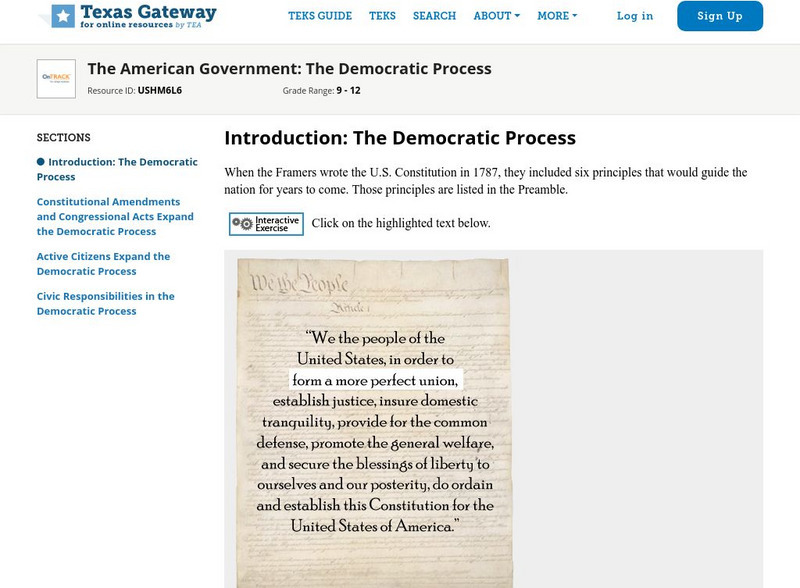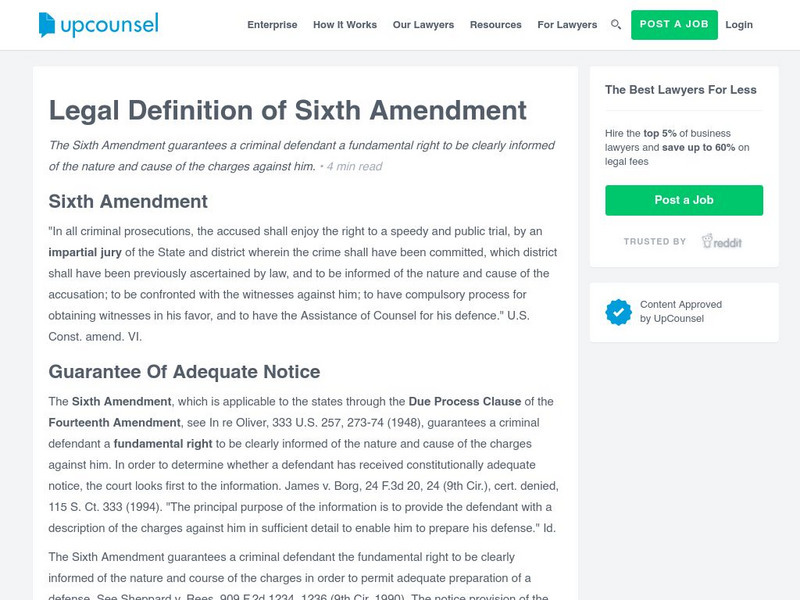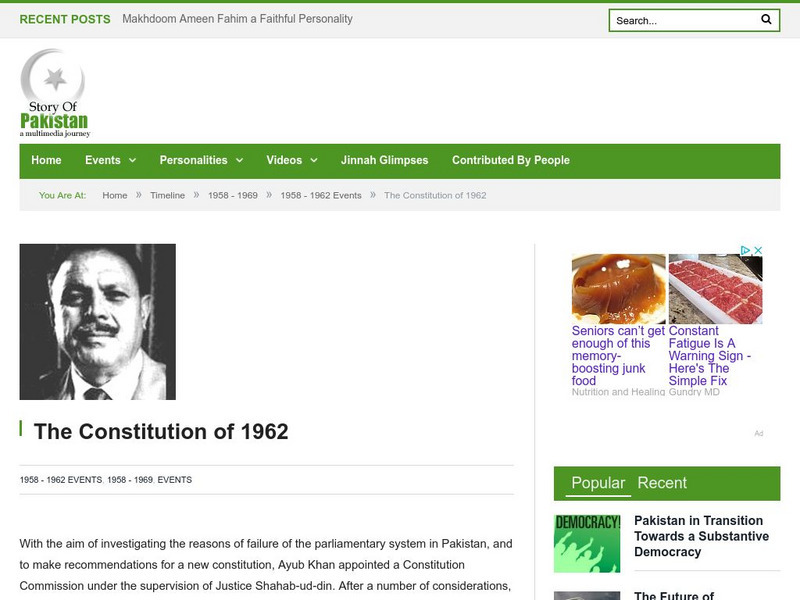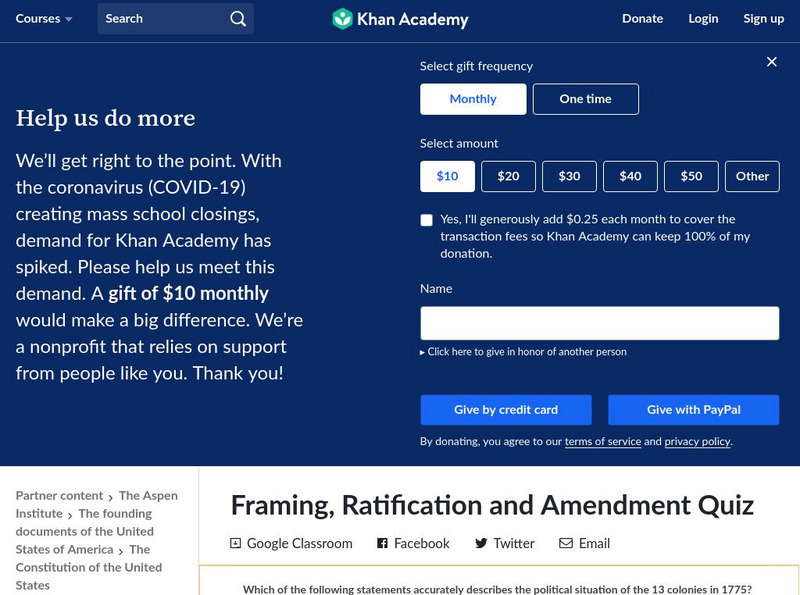Hi, what do you want to do?
Bill of Rights Institute
Bill of Rights Institute: Constitution Quiz: Constitution Duel
Challenge friends to a duel! As you take this quiz you will be asked to answer 10 multiple-choice questions in this knowledge duel to defend your constitutional honor. Questions will come from categories such as the Constitution, primary...
Texas Education Agency
Texas Gateway: The American Government: The Democratic Process
Given primary and secondary resources, students will be able to identify and analyze various methods of expanding the right to participate in the democratic process.
CommonLit
Common Lit: Why Does No One Ever Thank Me for the Magna Carta?
CommonLit.org is a wonderful resource to use in a Language Arts classroom. Each story or article is accompanied by guided reading questions, assessment questions, and discussion questions. In addition, students can click on words to see...
Lectric Law Library
The 'Lectric Law Library: Sixth Amendment
The "Lectric Law Library's definition and explanation of the amendment, including the "impartial jury" phrase.
Other
The Architect of the Capitol: Roger Sherman
This resource from the Architect of the Capitol is a government site that focuses on art and architecture in the U.S. Capitol. Features a picture of a marble statue of Sherman.
US Government Publishing Office
Ben's Guide to u.s. Government: Learning Adventures: Branches of Government
Introduction to a learning adventure on the Constitution and branches of government. Students click on their age group icon to find information on which part of the Constitution spells out the powers of legislative, executive and...
The Dirksen Congressional Center
Congress for Kids: The Legislative Branch: House of Representatives
Read a brief synopsis of the House of Representatives in the Legislative Branch, and then complete the short quiz to check for understanding.
CommonLit
Common Lit: Themes: America: What Makes America Unique?
This is a collection of Grade-Leveled texts (3-12) to address the question. "What makes America unique?" Select a grade level and a collection of on grade-level reading passages on the topic comes up. [Free account registration required...
PBS
Citizen Ben: Founding Father
As part of a larger site about the extraordinary Benjamin Franklin, this section focuses on his being one of founding fathers of the new United States of America. Read about the three major documents he signed as a delegate and diplomat.
Other
Story of Pakistan: The Constitution of 1962
This site from The Story of Pakistan explains the time leading up to the military coup in Pakistan, and the eventual suspension of the constitution. Mostly centering on the Constitution of 1962 set up by Ayub Khan.
Alabama Learning Exchange
Alex: Articles of Confederation
This lesson looks at the development of the constitutional government in the United States. Students use technology to explore history concepts.
Alabama Learning Exchange
Alex: Who Will You Back? (The First American Political Parties)
Students will produce an illustrated documentary on one of the first two American political parties.
Alabama Learning Exchange
Alex: Constitution Lives
As part of the study of the Constitution, students will do research on and create a Constitutional scrapbook and multimedia presentation on the Bill of Rights. Students will use various media print resources as well as the Internet to...
Alabama Learning Exchange
Alex: Circling the Bill of Rights
This is a hands-on, inquiry project to create a 3-D graphic organizer for the research and study of the Bill of Rights. It may be a stand-alone activity or may be included as part of a unit of study on the Constitution. Students will...
Khan Academy
Khan Academy: Framing, Ratification and Amendment Quiz
Quiz yourself over the framing, ratification, and amendments to the Constitution.
iCivics
I Civics: Benjamin Franklin Mini Lesson
"The First American", Benjamin Franklin, is the only Founding Father that signed all three major documents that founded the United States of America. Students explore the many roles he took during the founding of America.
iCivics
I Civics: Federalists & Anti Federalists
Look at the debate and eventual compromise, between the Federalists and Anti-Federalists that occurred around the creation of the U.S. Constitution.
iCivics
I Civics: Wanted: A Just Right Government
Look at the tensions and differences of opinion that existed among early American states and citizens. Learn about the Articles of Confederation, why the first "constitution" didn't work, and how compromise led to the Constitution.
iCivics
I Civics: Limiting Government
Explore the five basic limits on government through the true story of Peruvian president Alberto Fujimori, and other fictional cases of government power gone wild.
Khan Academy
Khan Academy: Us History: 1754 1800: Unit Test
Take this eleven question unit test over US history during the period of 1754 and 1800.
Khan Academy
Khan Academy: Us History: 1754 1800: Quiz 2
A quick comprehension check over the period in US history when the constitution was being established.
Khan Academy
Khan Academy: Us History: 1754 1800: The Constitutional Convention
Shortly after the end of the Revolutionary War, American leaders realized that the nation needed a new, stronger Constitution. But what would the new system of government look like?
Khan Academy
Khan Academy: Us History: 1754 1800: The Federalist Papers
In the Federalist Papers, Alexander Hamilton, James Madison and John Jay made the case for ratifying the new US Constitution.
Khan Academy
Khan Academy: Us History: 1754 1800: The Bill of Rights
The first ten amendments to the US Constitution guarantee citizens' essential freedoms and rights.






















